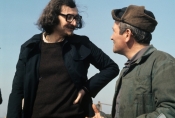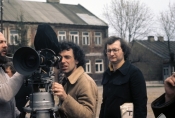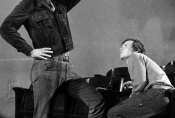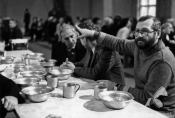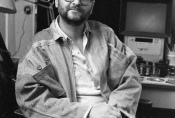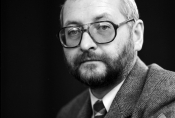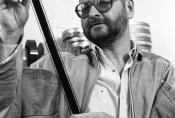Janusz Zaorski

Film, theatre and television director, screenwriter, actor, producer. He was born on September 19,, 1947, in Warsaw. The son of Tadeusz Zaorski, deputy minister of culture and art in 1957-1970, the brother of actor Andrzej Zaorski. graduate of the Directing Department of the State School of Film, Television and Theatre in Łódź (1971). While still a student, he was an assistant to director Janusz Morgenstern on the set of the television series Kolumbowie/Columbuses (1970).
He made his debut with the short, black humour story Na dobranoc/Good Night (1970). Two years later, he made his first full-length feature film Uciec jak najbliżej/Escape Close – the story of a boy attempting to re-evaluate his life. The comedy Awans/Promotion (1974), the successful screen adaptation of Edward Redlinski’s popular book on the moral and cultural transformation of the Polish countryside, brought him the Grand Prix in Gdansk (1975). The adaptation of Stanisław Grochowiak’s drama Partita na instrument drewniany/Partita for Wooden Instrument (1975) received an award for cinematographer Sławomir Idziak at the Polish Film Festival (1976). His subsequent films – Pokój z widokiem na morze/A Room with a Sea View (1977, Silver Leopard and the FIPRESCI award at Locarno), dedicated to the professional confrontation of two psychiatrists with a different approach to the scope of interference in human freedom and personality, and Dziecinne pytania/Childish Questions (1981), dealing with young people’s different attitudes to life, locate Zaorski closer to the cinema of moral anxiety.
He gained great recognition for his Matka Królów/Mother of Kings (1982; numerous awards in Gdynia, including the Golden Lion, 1987 Golden Duck, 1988; Golden Screen, 1988; Silver Bear in Berlin, 1988), based on the novel by Kazimierz Brandys and dedicated to the dramatic fate of Łucja Król (meaning “king”), a single mother raising four sons, set against the background of the equally dramatic fate of Poland between 1933-1956. Baryton/The Baritone (1984), which brought Zaorski the Grand Prix in Gdansk, as well as best screenplay award for Feliks Falk and a cinematography award for Witold Adamek, proved that the director felt perfectly at ease in a variety of genres. His further successful projects confirmed it: adaptation of the famous book by Stanisław Dygat Jezioro Bodeńskie/Lake Constance (1985 Grand Prix at Locarno) or Piłkarski poker/ Football Poker (1988), which – as the director put it himself – addresses corruption in sports.
Matka Królów/Mother of Kings proved that Zaorski is comfortable with stories on a grand scale, set over long periods of time. He confirms it in his Panny i wdowy/Maidens and Widows (1991), an epic tale about a hundred years of Polish history from the point of view of women which begins during the January Uprising and ends in contemporary times; or in Syberiada polska/Polish Siberiad (2012), based on Zbigniew Domino’s novel dedicated to the fate of Poles deported by the NKVD to Siberia in 1940.
In 1987-1989, Janusz Zaorski became a member of the Committee of Cinematography. In 1987, he was elected chairman of the Polish Federation of Film Clubs, and in 1988, he was made artistic director of the "Dom" Film Studio. In 1991-1993, he served as chairman of the Committee for Radio and Television, and in 1994-1995, he was chairman of the National Board of Radio and Television. He was awarded the Gold Medal for Merit to Culture – Gloria Artis (2011).
Jerzy Armata
Selected filmography
-
1982
THE MOTHER OF KINGS
